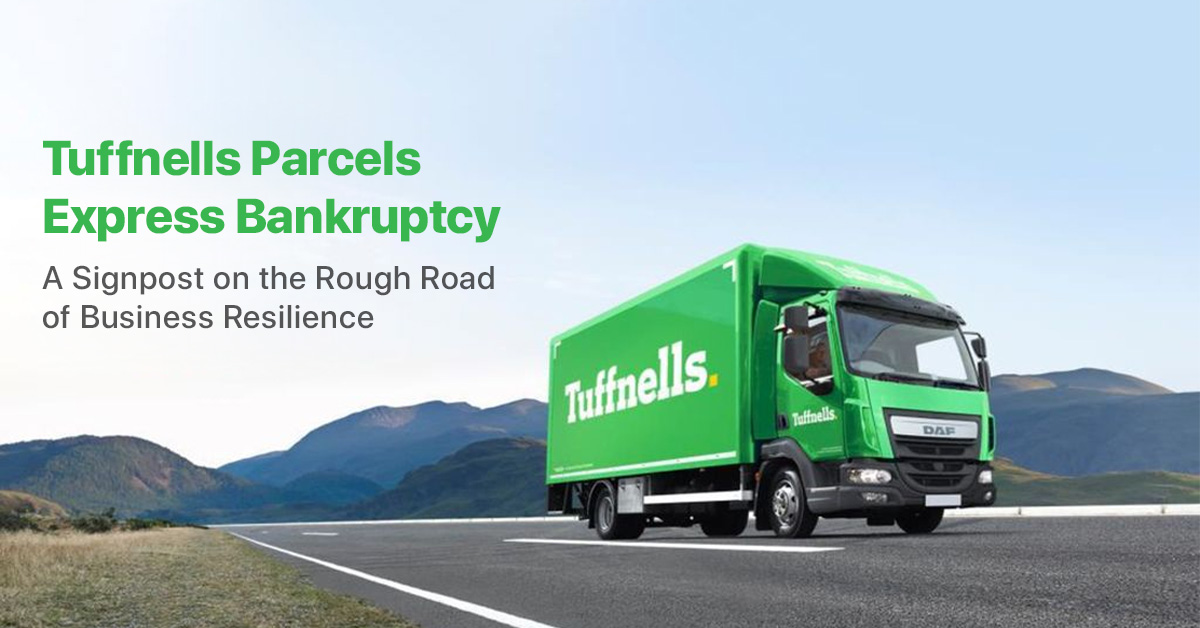In the challenging landscape of 2023, the term ‘Tuffnells Parcels Express Bankruptcy’ has become a somber keyword for discussions around business resilience and continuity. The collapse of this erstwhile thriving delivery company has not only led to the unfortunate redundancy of over 2,000 employees but also served as a stark reminder of the fragility of businesses facing unprecedented economic strains.
Before we look at the Tuffnells Parcel Express story, let’s take a look at what a company bankruptcy is. In the UK, a company’s bankruptcy is formally known as insolvency, is a legal status where a company cannot meet its financial obligations to its creditors. This process may result in the company entering into administration, where an appointed administrator restructures the business, or liquidation, where the company’s assets are sold off to repay debts. During this time, control of the company is handed over to an insolvency practitioner. The aim is to either rescue the business, achieve a better outcome for creditors than immediate liquidation, or equitably distribute the company’s assets. For shareholders, this often means a loss of their investment, while creditors are repaid from available assets.
The Tumultuous Tale of Tuffnells Parcels Express
Tuffnells Parcels Express, once a cornerstone of the UK’s logistics sector, specialising in the transport of large and bulky goods, found itself outmanoeuvred by a confluence of adverse factors. The company’s bankruptcy is symptomatic of the broader economic pressures that have been mounting on UK businesses post-Brexit, in the wake of the COVID-19 pandemic, and amidst the ongoing war in Ukraine. These events have combined to create a perfect storm of supply chain disruptions, labour shortages, and rising costs that have left many businesses struggling to adapt.
Unpacking the Reasons Behind the Collapse
The collapse of Tuffnells Parcels Express can be attributed to several key factors. Firstly, the company was operating in an incredibly competitive market, where margins are traditionally thin, and customer loyalty is hard-won. The fierce competition in the UK parcel delivery market exacerbated Tuffnells’ challenges, placing insurmountable pressure on cash flow.
Secondly, the company’s inability to secure further funding in critical times spelt the beginning of the end. When a business cannot shore up its financial defences through external funding, it becomes increasingly vulnerable to market turbulence.
Thirdly, the COVID-19 pandemic’s long shadow continues to affect businesses, with Tuffnells being no exception. The pandemic brought about a seismic shift in consumer behaviour and business operations, and companies unable to pivot have found themselves at a disadvantage.
Supply Chains and Energy Prices: The Double-Edged Sword
The disruptions to supply chains cannot be overstated. For a logistics company like Tuffnells Parcels Express, efficient supply chain management is the lifeline of its operations. The rising costs of materials and labour shortages have made it difficult for organisations to maintain profitability. Furthermore, the normalisation of remote work has reshaped the labour market, creating a mismatch in supply and demand for certain roles.
Coupled with this is the dramatic increase in energy prices, which have surged through 2023. For a company like Tuffnells, with a network of depots and a large fleet of vehicles, these costs are not just line items on a balance sheet but critical operational expenses that can make or break the business.
Inflation: The Invisible Thief of Profitability
Inflation has been another relentless pressure point. It chips away at the purchasing power of consumers and increases the operational costs for businesses. As inflation rates continue to rise, the squeeze on profits becomes even tighter, leaving businesses like Tuffnells struggling to keep their heads above water.
The Path Forward: Lessons from Tuffnells Parcels Express Bankruptcy
The bankruptcy of Tuffnells Parcels Express is not just a cautionary tale but also a source of invaluable lessons. For insolvency practitioners, the case underscores the importance of proactive financial management and the need for businesses to have robust contingency plans. It also highlights the potential of alternative funding sources and the necessity of keeping a finger on the pulse of market trends and consumer behaviour.
Adaptation and Resilience: The New Business Imperatives
The need for businesses to adapt has never been more critical. Those that can pivot in response to changing market conditions, consumer needs, and technological advancements are the ones that will survive and thrive. Business models must be resilient, with the flexibility to handle shocks and the foresight to anticipate them.
For companies facing similar pressures, it’s crucial to engage with insolvency professionals early. Early intervention can open up a range of possibilities, from restructuring and refinancing to exploring new business models that could provide a lifeline in turbulent times.
Charting a Course Through Uncertain Waters
Tuffnells Parcels Express bankruptcy is now synonymous with the challenges of operating a business in today’s volatile environment. It serves as a reminder that no company is immune to the forces of change which are reshaping the global economy. As we navigate these uncertain waters, it is essential to learn from such instances and build businesses that are not just efficient but also resilient, adaptable, and forward-looking.
In the wake of Tuffnells’ bankruptcy, there is an opportunity for all stakeholders in the business community to come together to support those affected and to reinforce the mechanisms that foster business continuity and growth. It’s through such collective efforts that the UK business landscape can hope to weather the current economic storms and emerge stronger and more resilient.
Here to Help
Insolvency is often viewed as a last resort for companies, typically pursued when all other options to resolve financial difficulties have been exhausted. It represents a critical juncture, signifying that a company cannot viably service its debt or pay its creditors. The process is designed to provide a structured and fair method for dealing with outstanding obligations while assessing the possibility of business recovery or orderly closure.
Facing insolvency can feel isolating, but you’re not alone. Contact us now for expert guidance and support. Let’s navigate this challenging time together and explore the best solutions for your situation. Reach out today — a brighter financial future is possible with the right help.






